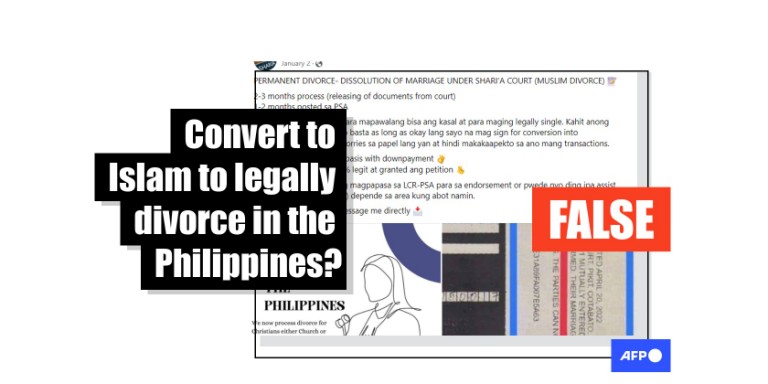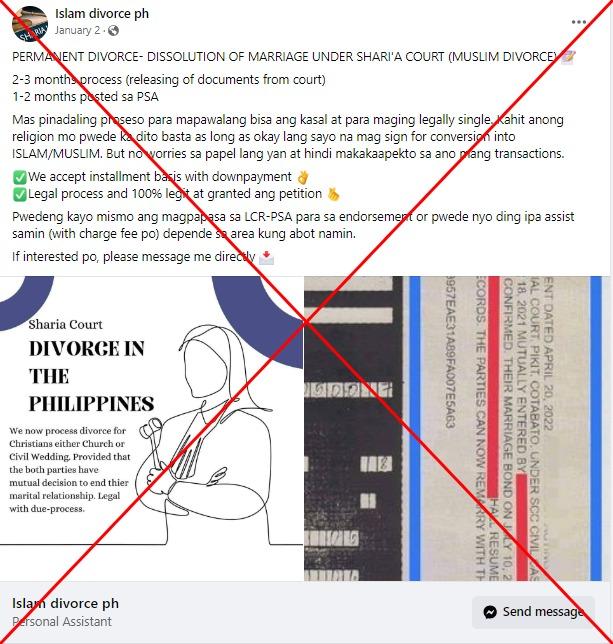
Converting to Islam falsely touted as 'pathway to divorce' in Catholic-majority Philippines
- This article is more than two years old.
- Published on February 14, 2024 at 04:52
- 2 min read
- By Ara Eugenio, AFP Philippines
"PERMANENT DIVORCE - DISSOLUTION OF MARRIAGE UNDER SHARI'A COURT (MUSLIM DIVORCE)," reads the caption of this Facebook on January 29, 2024.
Sharia courts practising Islamic law handle cases relating to personal laws affecting family relations and property among the Philippines' Muslim minority, estimated at ten per cent of the population (archived link).
The Facebook post advertises what it claims is an "easier process" to end marriages provided applicants are willing to convert to Islam, saying the legal steps are "100% legit".
The post also includes an infographic that claims the Sharia Court is processing divorce for Christians and a purported legal document that appears to show a successful divorce case.

The claim circulated in the Catholic-majority Philippines, where divorce remains illegal and annulment is slow and costly, with no guarantee of success. It is the only place outside the Vatican where divorce is outlawed.
Pro-divorce advocates argue the ban makes it harder for couples to cut ties to remarry and in some cases, escape violent spouses.
Sharia law provides for divorce, unlike the Family Code of the Philippines (archived link).
Similar false posts advertising divorce under Sharia law for non-Muslims were shared on Facebook here, here and here.
'Not allowed'
Multiple lawyers told AFP that the purported process outlined in the posts does not apply to non-Muslims.
"Islamic law only provides divorce for those who got married under Islamic law," said Anwar Radiamoda, director of Mindanao State University's Shari'ah Center, on February 9, 2024.
"If a couple got married under the Civil Code and converts to Islam to get divorced under Islamic Code, that’s not allowed," he said, referring to Article 13 of Presidential Decree No. 1083, the Muslim Code of Personal Laws (archived link).
Sharia counselor-at-law Pershing Taiyab also said couples married under civil law continue to be legally bound by it even if they convert to Islam.
"A man or a woman married under civil law by virtue of the Civil Code can’t divorce his/her husband/wife by conversion to Islam," he told AFP on February 8.
'Against public policy'
Katrina Legarda, a prominent Filipino lawyer specialising in family law, told AFP on February 2 that those who were married under civil law remain accountable under the system.
Legarda pointed to the example of a November 2021 Supreme Court ruling that found a man with a subsisting marriage guilty of bigamy after converting to Islam and marrying another woman under Muslim law (archived link).
False posts about divorce proliferated because of the Philippines' lack of the process, and Sharia law was now being used to "circumvent" the country's civil law, said lawyer Lorna Kapunan.
"A change of religion to Muslim just to be able to secure a divorce is contrary to public policy and law," Kapunan told AFP on February 9, 2024.
AFP has previously debunked Facebook posts falsely claiming that five years of separation was grounds for an annulment in the Philippines.
Copyright © AFP 2017-2026. Any commercial use of this content requires a subscription. Click here to find out more.
Is there content that you would like AFP to fact-check? Get in touch.
Contact us
